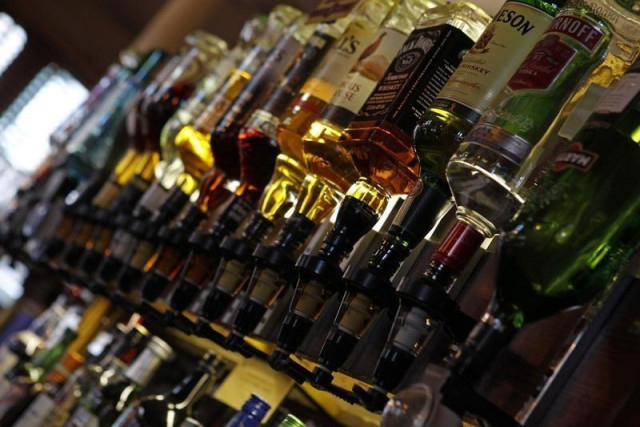Punjab to keep strict eye on distilled products
Lack of recordkeeping causes losses of millions through tax evasion and loss of life due to illegal moonshine
PHOTO: REUTERS/FILE
LAHORE:
The Punjab Excise and Taxation Department has launched the Smart Monitoring and Regulation of Distilleries and Breweries project. The aim is to prevent tax evasion, amounting to billions of rupees, while also strictly monitoring the sale and use of spirits/alcohol across Punjab.
The project will also monitor and regulate the trade and distilling of spirits for medical and industrial purposes. Under this project, modern equipment and cameras will be installed at 12 active distilleries, one brewery and 10 wine shops.
Computerised monitoring and records will be compiled at every stage from treatment of raw material to supply of the finished product to the consumer. Apart from this, Punjab Excise and Taxation Department has decided to computerise professional tax and cotton fee system, including human resource management, in 36 districts. Work on the project will begin in July 2019.
In Pakistan, the majority of spirit is brewed, traded and consumed in Punjab. Spirits are distilled in 13 distilleries and alcohol for consumption is brewed at the famous Murree Brewery.
Faislabad has five distilleries, while Sargodha has two and Sheikhupura, Nankana, Muzaffargarh and Rahim Yar Khan have one each. However, there is no current system of recordkeeping to monitor the sale and consumption of the brew or distilled product.
This not only causes losses of multiple millions through annual tax evasion, but also the loss of human life due to the availability of illegal moonshine. Under the law of Excise Department, two different types of license permits are issued. L17(A) and (L17(B) are issued for natural spirits L42(A) and (L42(B) are for rectified spirits.
Rectified Spirit is used for the manufacturing of medicine and illegal moonshine. At present, there are more than 2,500 license holders using manufacturing or using rectified spirit in Punjab. Natural spirit, meanwhile, is used for industrial purposes.
Colour manufacturing factories use it in large quantity and the same substance is used to produce different polishes. At present, there are around 500 entities manufacturing natural spirit or using it in Punjab.
The government has set a per-litre rate for spirits, but illegal trade enables tax evasion on a large scale. The Excise department has referred the matter to the court to recover an outstanding Rs3 billion in taxes from distilleries.
It has also decided to start a new project from the next fiscal year to eradicate irregularities. Under the initiative, CCTV cameras will be installed in store rooms, manufacturing units and on routes leading up to distilleries and breweries. This will allow the monitoring of every stage of the manufacturing and sale process, from the arrival of the raw material to the unit to the departing of trucks loaded with the finished products. The cameras will be monitored by the relevant authorities for all activity.
Special software will be developed with the help of the Punjab Information Technology Board for this purpose. It will record information of the amount of received raw material, the quantity distilled and how much of it has been delivered to dealers in different cities.
Without the record, trucks loaded with the distilled product will not be able to leave the distilleries. In addition, the dealer who receives the material will be bound to enter the details in the same software of the amount received, the purpose of its use and the proportion sold further on.
Excise and Taxation Department Additional Director Chaudhry Masoodul Haq says there are many technical errors in the present system. He adds that these circumstances, coupled with human corruption, are causing a huge less to the national treasury.
He outlines these factors as the reason for developing the smart monitoring project. “It is a centralized digital system through which every distillery, brewery and bar room or wine shop will be strictly monitored.
“We will train relevant staff. Under this system, we will be able to monitor bottle of spirit from the initial distilling to its final use. At present, there are 10 wine shops in Punjab from where complaints are received that alcohol is being sold to customers without permits.” He continues that the sale continues after official hours.
“Cameras and computers will also be installed at every wine shop. The sale of every bottle from bar rooms will be recorded and it will also be ensured the alcohol cannot be sold to non-permit holders.” Haq further states that another project to automate the department is also on the cards.

COMMENTS (1)
Comments are moderated and generally will be posted if they are on-topic and not abusive.
For more information, please see our Comments FAQ